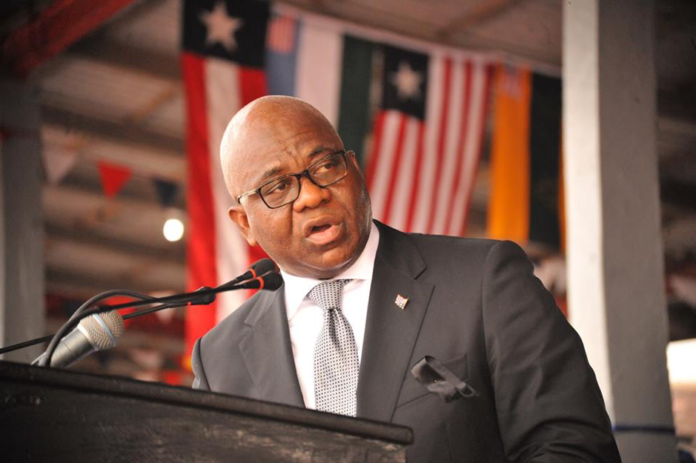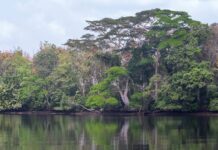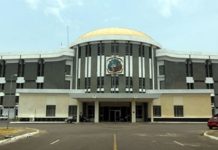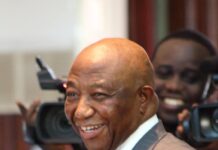
The Samukai et al AFL Pension Fund Case is creating National Embarrassment in the country for talk show hosts, judges and lawyers particularly those who love to go on radios and televisions to express their abysmal, weak and dismal opinions. They appear ill-prepared (meaning without researching the topics).
This has exposed the limitation of most Liberians particularly the category of neophyte so-called polemicists mentioned above.
The purpose of this article is to give free education and advice to my fellow Liberians, that the display of ignorant verbosity on a certain subject only epitomizes the unprofessional inadequacies of a person on radio or television much to their embarrassment. Let’s be reminded that value partners and our international friends are following these programs daily with disdain. This unpalatable asinine attitude only harms the country. These talk shows tell the audience outside the country the capacity of many Liberians, our officials of government and presenters.
The Liberia Supreme Court gave its ruling on the case involving J. Brownie Samukai, Jr. and others in February of 2021. Since this historic ruling, there has been a national debate on the certification of the Lofa County senator-elect, Samukai, Jr.
On August 23, 2021, Spoon TV invited Counselor and Honorable Sayma Syrenius Cephus, Liberia’s Solicitor General and Chief Prosecutor to discuss the genesis of the case. The show was hosted by the CEO and founder of the Spoon Foundation, Stanton Witherspoon and he had as co-hosts Rev. Dr. Henry Peabody, Ben Sanvee former Chairman of Liberty Party, St. Tomalin N. George, Keff Hassan, Abdullah Kaitamba, Dr. Francien Chenoweth Richardson and Honorable Isaac Doe, Deputy Minister of Youth and Sports of Liberia.
These are all very fine and educated Liberians. I am a regular listener to the show and I have often mentioned to some of my friends that the host and co-hosts do not often prepare themselves well for these discussions. The August 23, 2021 discussion with the Solicitor General proved me correct. It appears as though they have not even read the case file and the constitution, if they have, they were in solidarity with the Solicitor General. Below are some of my reasons.
The Solicitor General/ Chief Prosecutor informed the over three thousand listening to the discussion that Samukai, Jr. and others were indicted by the Sirleaf Administration.
First of all, let us define the word “indictment”. Indictment is a formal accusation, based on available evidence, that a person has committed a serious crime. This person is arraigned before a Grand Jury of 12 persons. The persecutor presents the evidence before the Grand Jury in the presence of the person to be indicted. The Grand Jury weighs evidence and if they are convinced, the person is indicted and charged with the crime(s). And if they are not convinced, the person is exonerated.
In some jurisdictions, the indictment is pursued prior to placing someone under arrest, while others place someone under arrest, and then send the case for indictment. Most often, a person will know that the police are interested in their crime; it’s normally not something that takes someone by surprise.
In Liberia, the prosecutor can do either one. The host and co-hosts would have asked more than a million questions after the learned Solicitor General and Chief Prosecutor made this statement. But because they were ill-prepared, they allowed the Solicitor General to get away with this statement “Samukai and others were indicted during Sirleaf’s Administration”. Some good questions would have been the following:
- “Can a person indicted by the Grand Jury serve or continue to serve after he or she is indicted”?
- Why were the defendants indicted for US$1,259,462.00 but found guilty for 1,147,656.35 and not the inducted amount?
- Did the AFL High Command Investigative Report as contained in the LACC report have enough and adequate evidence to indict the defendants in this case?
- On page six of the report count “d” reads “That apart from the Pension Funds, there were other funds deposited into the account.” What was the total of these other funds that were deposited?
- Is it not true that the defendants in this case were indicted in August of 2018?
- Since this is a financial case, why was it not necessary to conduct an audit of the account before the indictment?
I would have loved that the over 3000 plus listeners hear the Solicitor General answer to these critical questions. Unfortunately, the host and co-hosts did not ask any of these questions.
Let us look at the Summary of the report as produced in the Supreme Court Opinion as delivered by Justice Kaba. Below is the Summary of the AFL High Commend Investigative Report for you reading:
AFL Investigation Report
“The report of the AFL high command investigation, incorporated in the LACC’s report, found and concluded that a significant portion of the transactions affecting the AFL Pension Account was unrelated to the purpose and intent of the creation of the account. The report recommended that the AFL Pension Account remain separated from the Ministry of the National Defense’s operational expenses and that no withdrawal should be made against the account until a clear policy is adopted to manage the account. Excerpts from the AFL high command’ report are as follows:
“6. The following findings were established during the overview of the bank account statements:
- That USD account was opened at Ecobank on July 1, 2009, with account number 10929522222019 titled AFL Pension Funds, Saving Account.
- That the Minister of National Defense and the MoD Comptroller were the signatories to the account up to October 2017 prior to handing over the account to the AFL.
- That the first deposit to the account was August 26, 2009, with Eleven Thousand Two Hundred and Sixteen United States Dollars Forty Cents (US$11, 216.40)
- That apart from the pension fund, there were other funds deposited into the account.
- On August 31, 2011, the account number was upgraded from 10929522222019 to 0013174717655601.
- From July 2009 to November 3, 2017, a total of 103 deposits for pension fund and other deposits were made into the account in the sum of 1,943,971.99 USD; see details at Annex E.
- That the balance sum in the account, as at November 8, 2017, is 688,964.96 USD; details are at Annex E.
- There were several withdrawals from the account for disbursement to deceased families and retired AFL personnel as well as other withdrawals not meant for the purpose for which the account was intended for. The total amount withdrawn to cater for deceased families and retired personnel was147,303.20 USD, which is attached as Annex B. Similarly, the sum withdrawn from the account not meant for the purpose the Scheme was created was 1,147,656.35 USD as in Annex D. The total interest accrued in the account from July 2009 to November 3, 2017, is 118,188.15 USD which is attached at Annex C. The summary of all transactions as contained is at Annex E.
- That there were inconsistencies in the payment into the Pension Funds Account where monies were paid in part and, at times, not within the specified period.
- That the AFL pay roster did not reflect each personnel contribution to the Scheme. Deductions were usually done by calculating the number of personnel as per rank and deduct the money and pay the cumulative total into the Pension Fund Account. Therefore, the MoD does not have comprehensive data of each personnel contribution to the Scheme.
- That there has been no approved policy governing the management of the said fund. However, Headquarter AFL has submitted a draft policy on the management of the Pension Fund to the Ministry of National Defense for approval.
- That the payments of funds to the beneficiaries were done at the discretion of the Minister;
- From the period the AFL took over the account, there has been no withdrawal made from the account.
- The Eco Bank Statement balance contradicts MoD’s balance statement.
Conclusion
Based on the findings, the AFL Pension Account had many transactions other than what it was intended for. More so, there has not been comprehensive data of each personnel contribution into the account, but deductions were made as per the number of personnel in rank and paid cumulatively into the account. The Committee also observed that there was no mechanism put in place to inform the personnel of their monthly contributions. Thus, there was no written policy guiding the management of funds in the AFL Pension Account even though troops were aware that the funds were meant for deceased families and those retired personnel. There was, therefore, the need to give appropriate direction on the proper management of the funds.”
What the AFL High Command Investigative Report simply found out? There is a need for an audit of the Pension Scheme Account. An audit was necessary to verify counts d, f, h, I and l in the report. For example, in count d, “That apart from the pension fund, there were other funds deposited into the account.” How much was these extra deposits that were not related to the pension scheme? The AFL High Command Investigative Report did not state the amount. This can only be done by the auditor(s). And in count h, the report indicated that the total deposited in the account was US$1,943,971.99 and the balance as of November 3, 2017 was USD688,964.96. If you do the simple mathematics, the difference is US$1,255,007.03. AFL High Command alleged that only 147,303.20USD was withdrawn for the intended purpose. If you subtract this from the fund, you get a balance of US$1,107,703.83. Hence it is not possible for Samukai and others to withdraw US$1,147,656.35s. from the account for intended purpose because the account did not have US$1,147,656.35. It was unfortunate that Samukai’s lawyers could not pick up these simple things which would have either helped to acquit them or may have led the court to institute an audit of the account.
Former Solicitor Generals like Winfred Smallwood, George Henries, George S. B. Tulay and Taiwan Gongloe would have requested for an audit of the account before indictment.
Unfortunately, the learned Solicitor General/Chief Prosecutor of Liberia, the only Liberian Lawyer, who is member of the European Bar did not. What a sad situation. The Twelve -man Grand Jury that indicted Samukai and others were sweet talk by the councilor just like he did with the host and co-hosts of Spoon Talk on August 23, 2021.
Prohibition
Coming to the prohibition to the Supreme Court requesting the Court to deny Senator-elect certification, this is another embarrassment. The constitution does not prevent an elected public official from being certificated and there is NO LAW in our status to prevent the same. If there is one, let the Solicitor General/ the Ministry of Justice cite the same. What was cited in both MDC and the Ministry Justice prohibitions as reliance for prohibition is an article in the Election Laws. Now let us look at the Election Laws.
Chapter 3.17- Registration of Voters
Subchapter A: General Provision
Every citizen of Liberia who has attained the age of eighteen (18) years or older, may register as a voter except one who has been Judiciary declared to be incompetent or of unsound mind or who has been disenfranchised as a result of conviction of an infamous crime and has not been restored to citizenship. Maybe let me define for some of you what an Infamous Crimes are: Infamous Crime is crime that have been judged infamous because they constitute Treason or Felony because they involve moral turpitude of a nature the create a strong presumption that the person guilty is unworthy of law, or because it subjects the one guilty to infamy. You all know what treason is, hence I will not define it. Felony crimes are (rape, murder, robbery vandalism kidnapping and arson). You know that Samukai and others were not charged for any of the above crimes.
Subchapter E: Alteration of Registration Rolls
- 3.23 Names of Disenfranchised to be furnished by the Minister of Justice
- “The Minister of Justice shall send to the Commission annually in the month of December a list containing the names and addresses of all persons judicially convicted and sentenced for disenfranchise able offense and disenfranchisement continues.
- He shall also furnish along with the list, the registration cards of all persons.”
The Election Laws Chapter 3.17 Sub Chapters A and E of the law prevents convicted persons from voting registering in an election but does not deny convicts from contesting. Like the United States of America, this section of the law is a photocopy of the Election Laws of America. In Canada and some states in the United States of America, no convict is disqualified from contesting a Federal Elective Position. The Solicitor General and the lawyers of MDC are chasing shadows by using this law. The honorable Supreme Court is now embarrassed to rule on these prohibitions because the constitution of Liberia and that of the United States of America do not disqualify a convict from contesting in Federal Election. However, sixteen of the fifty-one states have laws that disqualify convicts from participation in a state election and thirty-one do not have such laws, meaning a convict is qualified to contest in state elections.
The requirements for one to qualify to participate in an election are in Article 30 of the Constitution of Liberia.
Article 30 of the Constitution of Liberia
This article reads as follows: Citizens of Liberia who meet the following qualifications are eligible to be members of Legislature.
Requirements for senators
- Must have attained the age of 30 years and
- Be domiciled in the county or constituency to be represented not less than one year prior to the time of the election and a taxpayer.
Now you have read the New Election Laws and the qualifications for senator are cleared. It is interesting to note that the MDC and the Justice Ministry prohibitions have been at the Supreme Court for more than four months and are still there. When the lower Court judgement was delivered in 2020, eight months before the December 8, 2020 election, some citizens of Lofa petitioned the Supreme Court to stop Samukai from participating in the election because he was a convict. The Supreme Court ruled against them, because the court knows that when a case is on appeal and awaiting final ruling the defendant cannot be disqualified. Equally so, there is clause or article or part in the Constitution to stop an elected senator from being certificated. The sooner we understand this the better.
Can an indicted or convicted person, who is serving prison term run for elective position? And if he or she wins serve his or her term? In the United States of America, the answer is yes for Federal Elections. A convicted person in prison can run for Federal elective office because there is no part of the United States of America Constitution that prohibits a felon from contesting. In Alaska, Senator Ted Stevens was convicted of seven felony counts of corruption, but ran for re- election in 2008. In 1798, Representative Mathew Lylon ran for Congress and won from prison. He assumed his seat after serving his term. In Ghana, Nkrumah was in prison when he was elected, in Kenya, Kenyetta was in prison when he was elected, and in South Africa Mandela was in prison when he was elected. All of these people were convicts. I can go on naming convicts who were serving prison terms and were elected by their people and they were freed/released to enable them to serve their country.
Let the Supreme Court do the honorable thing by ruling in the Samukai case pending before her according to the Constitution and laws of Liberia. The Constitution of Liberia calls for two senators per county and Lofa being represented by one senator is a violation of the Liberia Constitution.
Supreme Court Precedents
Equally so, the Supreme Court can use Precedent of the court, which should have been done in the first place. The Supreme Court of Liberia has decided two cases similar to that of Samukai’s, when it comes to variance in the amount in the indictment and the evidence amount; One in 1978, Gaye vs RL {1978] LRSC 41; 27 LLR 239 (1978) (29 April 1978) and Ankra vs RL [1979] LRSC6; 28 LLR76(1979) (15 June 1979). In both cases, there was a variance between the amount in the indictment and the amount produced during the hearings. The case Gaye vs RL, Chief Justice Pierre delivered the opinion and the lower Court ruling/judgement was reversed and the defendant discharged and freed. In the Second case the Court opinion was delivered by Justice Tulay (Frederick K.) and again the lower Court ruling was reversed and the defendant was freed. In the Samukai Case, Samukai and the others, they were indicted for misappropriation of US$1,259,462.00 but let us agree with the judge that they misappropriated US$1,147,656.35 as per the two cases cited, the amount misappropriated and the amount in the indictment do not match. There is a variance and per the court precedents, as cited in the cases above, the lower court judgement should have been reversed and the defendants freed.
One thing we should know by now is whether or not Samukai is certificated, there can be no bi-election in Lofa to replace Samukai. There is No law to support this action. And until the nine- year service period ends or Samukai resigns or falls ill and is incapacitated, there can be NO Bi-ELECTION for his replacement. It is just a matter of time, Samukai will be seated.
Now to the Honorable Chief Justice, who, I believe, is aware of the importance of the Judicial in a Democratic Government. Below is the role of the judiciary in a democratic government.
The Judicial is the constitutional hope that the citizens of any country can look for help when their rights are jeopardized. For the realization of human rights, vibrant democratic machinery with the rule of law and the judiciary is essential. This is only possible when the judiciary and the legal profession are independent and immune from political and ordinary influences such as inducement and bribery. Under such conditions, the judiciary and the legal profession shine with integrity and gain the respect of the citizens as well as encourage foreign investors to invest, hence the country develops.
From the citizens’ point of view, the judiciary is the most important organ of the government because it acts as their protector against the possible excesses of the Legislature and Executive. It plays the role of guardian/protector of the constitution and the fundamental rights of the people, and this makes it more respectable than the other two organs of a democratic government.
And one member of the judiciary be it a judge or lawyer, the whole judiciary is.
If the people have faith in the judiciary of their government, they will have faith in the quality, integrity and efficiency of their government.
What need to be done now by Samukai’s Legal Team
Filing of a Review Petition to the Supreme Court
The parties aggrieved on any order of the Supreme Court on any apparent error can file a Review Petition. Taking into consideration the principle of Stare Decisis. The Supreme has the power to review its rulings to correct a patent error. In the United States, the Supreme Court has overturned more than 300 of its own cases over the past 244 years. This is 1.23 cases per year.
Who can file a Review Petition? Any person aggrieved by the ruling can seek a review. In this case it would be Samukai or those who voted for him in Lofa.
Chief Justice Comment on May 13, 2021
The Chief Justice comments on May 13, 2021, when deputized for President Weah in performing the commissioning of the National Labor Court Judge and the opening of the Circuit Courts according to several paper outlets, he said that he noticed that Judges are involved in bribery and caution them to desist. Some papers even wrote that the Chief Justice admits that judges are corrupt. In another paper the Chief Justice admits that the Liberia Judiciary is not free from corruption. If any of the above statements is a quote from the Chief Justice, then it is bad for our country. And what makes it worse is that the Chief Justice did not name any judge that he has noticed to be involved in bribery. I wonder what the Chief Justice was thinking when he made the statement? Should this be an indictment on the Judiciary? Does this statement encourage Foreign Investment? The statement of the Chief Justice placed a dark cloud over the Judiciary and the government as a whole. Does the Chief Justice believe that the citizens and our foreign partners will continue to have FAITH in the Judiciary and government? Of course, the answer to this question is a BIG NO.
Every judge in the Judiciary is now a suspect of a judge that is involved in bribery.
To restore Faith in the Judiciary, the Chief Justice needs to shame those Judiciary Members that are involved in bribery if not this will continue.
Written By Hun-Bu Tulay, Email: ntevoma@gmail.com
Cell #s: +231-777-111-032/886-517-356

























Comments are closed.